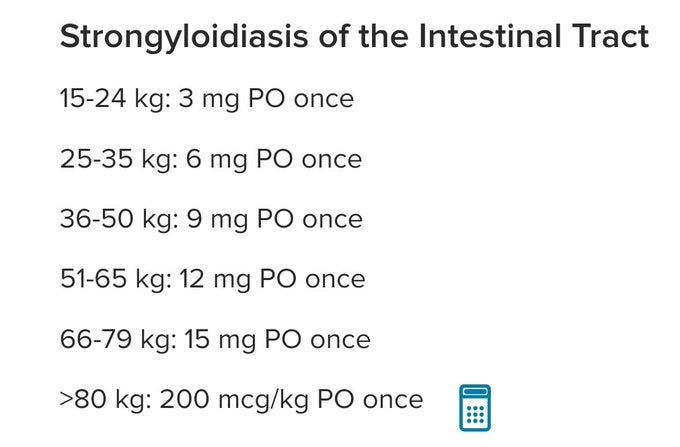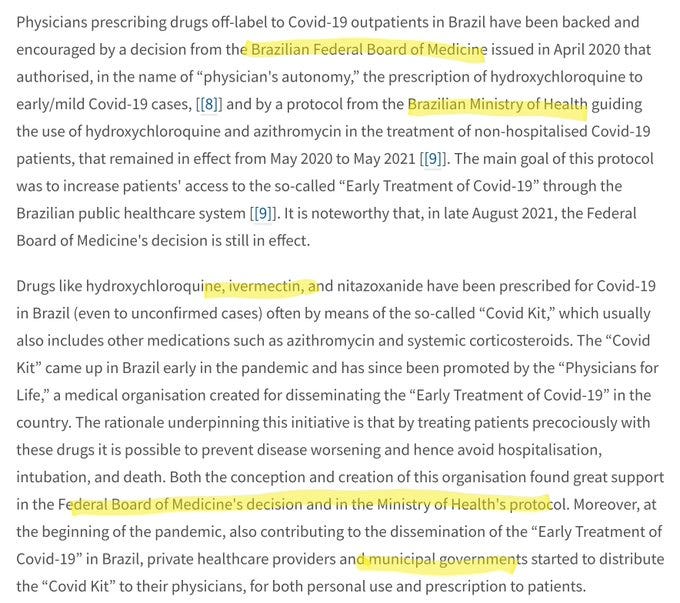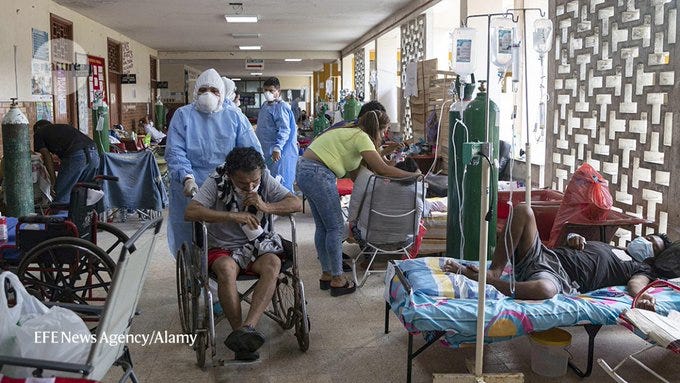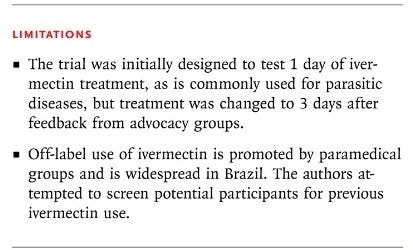This article is part of a series on the TOGETHER trial. More articles from this series here.
Looks like the TOGETHER ivermectin paper in the New England Journal of Medicine has been updated (again).
There is a new research summary added, which contains a limitations section—57 words all in all, but so much to talk about.
Almost every word here has something interesting (insidious) going on, so let’s walk through it slowly.
The trial was initially designed to test one day of ivermectin treatment.
Who treats a virus with a single dose of anything? Which antiviral works with just one pill? Tamiflu doesn’t. Paxlovid doesn’t.
Here's why this matters: RCTs are designed with an emphasis on preventing false positives. The prevention of false negatives is mostly left up to the investigators, since they are usually financially invested in the success of what they test.
As a result, there is little to prevent an investigator from designing a trial to fail. How might they do that? Well, defining a single dose is a pretty good way. And, by the way, it wasn’t 400mcg/kg as described. The dose didn't scale past 60kg of patient body weight. So someone at 120kg (265 lb.) would get half.
…as is commonly used for parasitic diseases…
Except—for parasitic diseases—there is no upper weight limit in scaling. Also, are you trying to cure a parasite? No. So why dose for parasites? I've never heard a good explanation.
Here's what medscape.com quotes as guidelines for Strongyloidiasis. It’s the same everywhere you look. Note that they clearly say that if you’re over 80kg in body weight, you should continue to increase the dose—they even offer a nice little calculator you can use to figure out the right number of pills!
…but treatment was changed to three days after feedback from advocacy groups…
Well, they should be thankful. But really, who were these "advocacy groups?” I know it wasn't FLCCC, I asked them. Why don't the authors tell us who these groups were? (Hint: the actual answer makes this statement ludicrous.)
Also, why is this cited as a limitation? Did something happen during that change in dosing that compromised the results of the study?
…off-label use of ivermectin is promoted by paramedical groups…"
What's a paramedical group? Are there groups of paramedics, going around in ambulances, throwing pills at people? The implication that there aren't actual doctors promoting ivermectin is disgusting. But it gets much worse.
…and is widespread in Brazil.
Huh! I thought the principal investigator swore up and down that it wasn't used much. Was he lying? What was his basis for saying that to people? This is what he said to Steve Kirsch in an email:
At the time we did our study, IVM was not particularly popular for use in Minas Gerais. Even if some patients did access IVM, the fact that it is blinded should still maintain balance.
But wait. What "paramedical group" was promoting this off-label use in Brazil, where the trial took place? Could it be... The Brazilian Ministry of Health? Maybe the Brazilian Federal Board of Medicine?
The authors should be ashamed of themselves.
Here’s what a paper in The Lancet has to say about that:
The authors attempted to screen potential participants for previous ivermectin use.
"Attempted?”
So what stopped them? What got in the way? Was something causing them issues? Perhaps... THEY DIDN'T HAVE IT IN THEIR EXCLUSION CRITERIA? Strange, that.
Of course that didn't stop them from coming out swinging in the discussion section, making themselves look like saints. It sounds almost like it wasn't in the exclusion criteria. Since it's in the discussion and everything. Notably absent from exclusion criteria in the protocol.
And yet…

So which is it? Did they exclude, as Mills said? Did they ensure, as they say in the discussion? Did they do nothing, as in the exclusion criteria (the obvious place for such information)? Or did they "attempt to screen," as is written in the limitations section of the new summary?
I certainly think the lady doth protest too much. There's an obvious way to do this: declare it as an exclusion criterion. And there's an obvious reason not to do this: you'll have recruitment issues, as described in this article.
Overall, these few sentences are truly an amazing artifact. The authors blame the limitations of their work on "advocacy groups,” "paramedical groups,” and say they "attempted to" do certain things that are straightforward. But in no place do they accept responsibility. Incredible.
It quite simply blows my mind that the New England Journal of Medicine has allowed the authors to make material changes to the paper twice now, without any acknowledgement of what changes were made. And that the authors are still radio silent on the many MANY issues.
Let’s appreciate this one more time:
P.S. We will resume our regularly scheduled number-dense posts shortly.
This article is part of a series on the TOGETHER trial. More articles from this series here.










Thanks for so carefully dissecting and elaborating on the efforts being made by the TOGETHER investigators to wiggle out of the scientific misconduct (or criminal misconduct) corner they have backed themselves into with their lies and obfuscations.
Keep digging that hole, PI's. How does it feel to know you've been caught creating a false narrative that could kill thousands? What will your children think of you?
You see Alexandros they had to write that because the alternative doesn’t make for very good reading:
“Our expert clinicians in designing this trial laughably chose 1 dose, on the laughable basis of that is what is used to treat a different condition. Advocacy groups which included non-medically trained members of the public could even recognise the laughable nature of this incompetence, so therefore we had to change it to the lowest dose possible in order to minimise the chance of a positive result.
Additionally the Brazilian health authorities unfortunately do not have medical degrees we recognise but despite this we reluctantly acknowledged their recommendation for the public to take Ivermectin to treat covid. Almost certainly this did not effect the outcome of the study because we predetermined that Ivermectin doesn’t work anyway, and therefore it could not possibly change the results”
Doesn’t quite have the same ring to it does it?